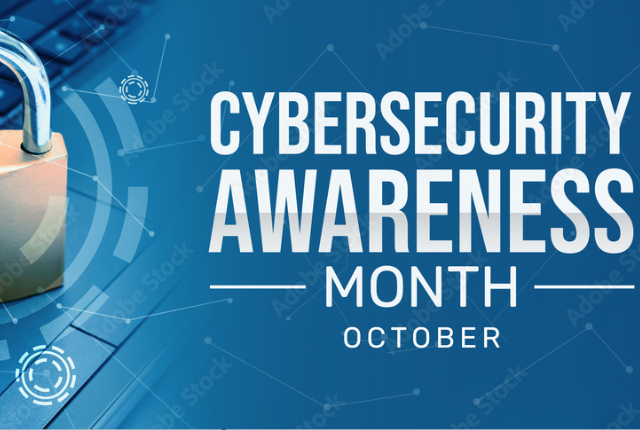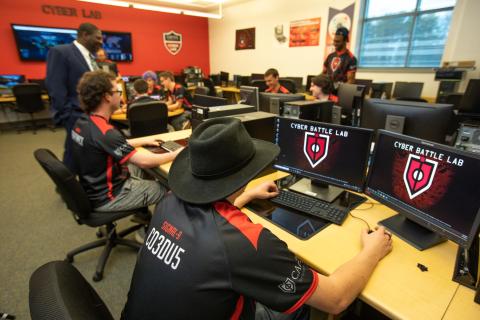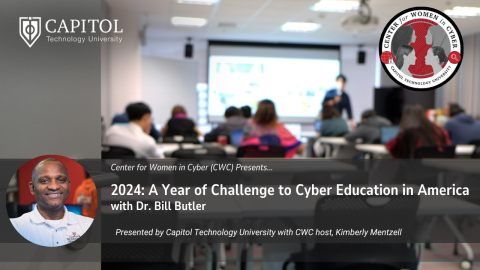Higher education in the field of cyber faces many challenges – and these challenges continue to grow as our society increasingly relies on the use of technology. With the evolution of AI, advancements in machine learning, and prevalence of cybercrime, the need for educated professionals with cybersecurity expertise is crucial.
However, there is a definitive gap when it comes to technology use and cyber education, especially at the pre-college levels. This can put students at a disadvantage as they pursue higher education and careers in a technology-focused job marketplace, and educators often struggle to teach these skills because they are not given the proper tools or advanced curricula required to excel in these areas themselves. Every new school year brings the need for updated teaching materials and next generation equipment, along with improved training to navigate this evolving technology. But often, that need is not addressed. And without these critical resources, teachers may struggle to cultivate an educational, technology-driven environment for their students.
The pillars of a future-focused education have a strong foundation in cyber learning, and Capitol Technology University sees this need and addresses it as a core part of our program development.
Solving the Challenges of Cyber Education
The challenges to cyber education are complex and require the consideration of many factors when trying to address the underlying issues involved. In order to solve these challenges, one must look at the ways in which technology is used now and try to predict possible complications in the future based on this knowledge.
Engagement
While many of today’s students enjoy the offerings of the cyber world, like social media and video games, some are not interested in learning how these things actually work. Providing an environment that is both engaging and educational is important in cyber education. Hands-on skills and experience in the classroom like working with motherboards or Raspberry Pi’s, programming, ethical hacking, performing cybersecurity analyses, and similar can give a wider skillset as well as practical associations with how things work. Networking with people in the field through partnerships and internships with cyber industry leaders can also cultivate an appreciation for the world of technology, while giving insight into what it takes to be successful in this field.
Artificial Intelligence
The perpetual evolution of technology brings new and easier ways of doing things, which can be both beneficial and detrimental to cyber education. One example is seen with artificial intelligence. AI offers both an exciting doorway to expedited processes and enhanced opportunities, but it can also provide a way to bypass learning. Why write a research report for class when an AI bot can do it for you? This mindset can prove problematic to the overall learning process, and navigating the ethics and proper uses of technology can be difficult without a firm foundation in cyber education. It is important to not just use technology, but learn how it works so that one can command it, and in turn, command one’s future in cyber as well.
Accessibility
Technology use seems to come easy to the younger generation, as their whole lives have revolved around computers. But do proximity and routine guarantee true understanding? And what about the older generation, who experienced the technology takeover from a different perspective? Accessibility considerations for technology are important, as well as reaching all audiences, because not only students but educators themselves need to be trained in this growing field. And “teaching the teacher” is an important aspect of instilling cyber education in all generations.
Educating the Next Generation of Cyber
Capitol Technology University was founded in technology education. Eugene Rietzke established Capitol as a U.S. Navy veteran who understood the importance of technology and its lasting impact within society. He recognized, even back in 1927, that technology education was the key to career advancement, as he himself worked with radio technology that constantly evolved and improved.
Today, our university’s president Dr. Bradford Sims continues this strong, long-standing tradition of cyber and technology education that meets the changing needs of the industry. Dr. Sims leads Capitol in the cyber arena by fostering an inclusive, accessible, and future-focused environment for career development. His solution to the issues of cyber education has been to develop career-based programs, keeping a finger on the pulse of where gaps in the industry are forming, not only nationwide but internationally. He has worked to create programs that are in-demand to meet the needs of our students – the future leaders in cyber. He also works to establish labs and centers for mentorship, and partners with experts in the industry so students can learn real-world skills and garner insight into the cyber field.
Dr. Sims states that "addressing the evolving challenges of cyber education is not just about adapting to the technology of today, but envisioning the needs of tomorrow. At Capitol Technology University, we are deeply committed to bridging the gap between technology use and cyber education. Our mission is to empower the next generation with the skills, ethics, and critical thinking necessary to thrive in an interconnected world. We believe in nurturing not just the intellect, but the spirit of innovation, ensuring our students are not just consumers but pioneers of technology."
One important way Capitol is impacting the cyber education arena is through our new Capitol Cyber Sleuths program: a GenCyber camp for teachers and a cyber education initiative of the National Security Agency (NSA). This program was created in collaboration with Dr. Kellep Charles, Capitol's current Chair of Cybersecurity Programs, and Dr. Bill Butler, Vice President of Academic Affairs and former Cybersecurity Chair.
Our first session was held in July 2023 and will be held every summer. This program was developed to increase cybersecurity interest and build a competent, diverse, and adaptable cybersecurity workforce pipeline via the National Centers of Academic Excellence in Cybersecurity (NCAE-C). It is designed for K-12 educators and teachers to ensure they can educate their students in cybersecurity topics as a part of the solution to address the continued need for skilled cyber professionals. The Capitol Cyber Sleuths program provides awareness of college and career pathway opportunities for K-12 teachers to impart to their students. Additionally, it is focused on helping teachers and students understand correct and safe online behavior, while improving STEM teaching methods and cybersecurity content for K-12 curricula.
Dr. Butler confirms that “Capitol is poised to address the challenge of educating the next generation of cyber educators with industry informed curriculum, hands-on training addressing critical competencies, and continuing mentorship and development.”
Another way in which we demonstrate our commitment to training the next generation of cyber educators is through the development of a Master of Education (M.Ed.) and Doctor of Education (Ed.D.) in Cyber Science. These degree programs offer a path towards exploring where technology and cybersecurity meets higher education. The M.Ed. in Cyber Science offers an introduction to the field of cyber education where students develop a deep proficiency in the application of STEM principles, computer science, networking, and information technology to the academic platform. Students also learn educational leadership skills that can benefit positions within a wide range of cyber-adjacent industries worldwide that are in need of experienced professionals, team leaders, and innovators.
The Ed.D. in Cyber Science offers the highest level of proficiency, leading to the production of a high-quality dissertation thesis and/or publications, culminating in the conferral of a doctorate degree.
These degrees are tailored for current educators who wish to advance their knowledge and opportunities in teaching and research, as well as new industry professionals with a desire to teach at the highest levels and contribute to the body of knowledge in the diverse field of Cyber Science.
Capitol Technology University is a trusted leader in technology education. As an accredited academic institution recognized by the NSA as a National Center of Academic Excellence in Cyber Defense (NCAE-CD), our university plays a vital role in shaping the future of cyber education. We offer many paths to success in the field of cyber, from our award-winning cyber programs to our expert faculty, and our students are some of the most highly sought-after innovators and future leaders chosen for top careers in technology. Additionally, our university was recently honored as one of Forbes America’s Top Colleges, ranking in the top 8% based on our excellent alumni success rates.
Learn More about Cyber Education
Visit our website to explore our many cyber-focused programs.
Discover our many cyber offerings, including our Center for Women in Cyber, our Cyber Battle Lab, and other resources.
Learn more about our GenCyber + Capitol Cyber Sleuths program and ways to sign up for our next summer session.
Register for an upcoming cyber webinar:
2024: A Year of Challenge to Cyber Education in America
With Dr. Bill Butler, Thurs., Oct. 19, 2023 at 12:00 p.m. ET






